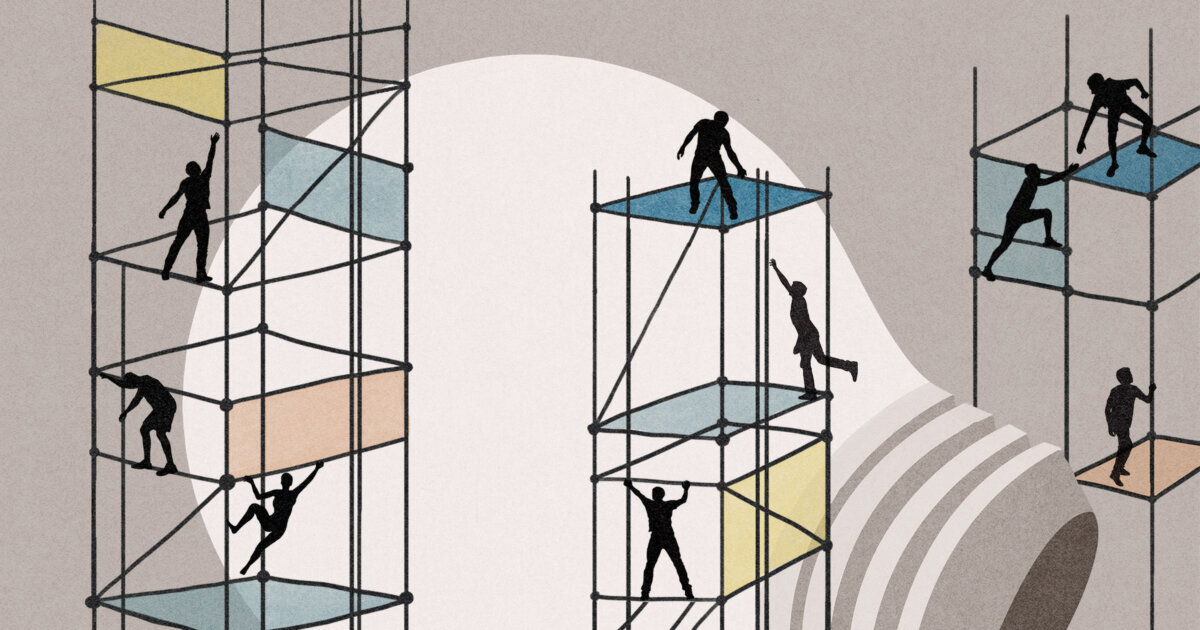   
CEO Picks - The best that international journalism has to offer!
 S64 S645 Ways to Future-Proof Your Career in the Age of AI   What can we do personally to stave off the displacement that may happen as a result of AI? In this article, the authors offer five strategies to future-proof your career in the age of intelligent machines: 1) Avoid predictability. It’s important to remember that AI isn’t generating new insights; it’s a prediction engine that merely guesses the most likely next word. 2) Hone the skills that machines strive to emulate. 3) Double down on “the real world.” 4) Develop your personal brand. 5) Develop recognized expertise in your field. Even if AI performs “first draft” functions, it still has to be double-checked by a trusted and reliable source. If that’s you, you’ll continue to be sought out because you have the authority to vet AI’s responses.
Continued here
|
 S44 S44The Trouble With Trump's Tariffs   Congress has the prerogative on trade policy—but it has abdicated in favor of presidential whim.Last week, before taking the mug shot seen around the world, Donald Trump made news in a different way, suggesting in an interview with Fox Business that if he’s elected president, he’ll impose a 10 percent across-the-board tariff on foreign imports. “When companies come in and they dump their products in the United States, they should pay automatically, let’s say, a 10 percent tax,” Trump said. “I do like the 10 percent for everybody.”
Continued here
|
| ? |
 |
 S52 S52High-School English Needed a Makeover Before ChatGPT   Last December, Moby-Dick made one of my students gasp. It wasn’t the first time this had happened (weird book), but nothing about the text itself produced the response. For the final project in my English class for high-school seniors, where we spend a semester reading Moby-Dick, I assigned a pretty standard eight-to-10-page research paper. One student, interested in finance, saw a connection between the plot and the 2008 financial crisis. He spent weeks thinking about the parallels, trying to find a way to make all of the pieces fit together into a cohesive argument about whaling and the exploitations of global capitalism. On the day before the paper was due, I happened to walk past his computer as he watched ChatGPT perform in 10 seconds what had taken him many hours and many cups of coffee.Maybe you have also experienced the distinctive blend of emotions elicited by first using ChatGPT—a deflating sense of wonder, a discomfiting awe. I certainly have. Since the emergence of generative AI last year, trying to envision the world we’re rapidly heading toward has been a vertiginous exercise. Coders may be replaced by algorithmically perfected, non-salary-receiving robots. In 2027, your favorite thing to listen to while walking the dog may be AI Taylor Swift giving you personalized affirmations about getting over your ex and moving on with your life.
Continued here
|
 S62 S62D.H. Lawrence on the Hypocrisies of Social Change and What It Actually Takes to Shift the Status Quo   Each month, I spend hundreds of hours and thousands of dollars keeping The Marginalian going. For seventeen years, it has remained free and ad-free and alive thanks to patronage from readers. I have no staff, no interns, not even an assistant — a thoroughly one-woman labor of love that is also my life and my livelihood. If this labor has made your own life more livable in the past year (or the past decade), please consider aiding its sustenance with a one-time or loyal donation. Your support makes all the difference.“Progress is never permanent, will always be threatened, must be redoubled, restated and reimagined if it is to survive,” Zadie Smith wrote in her superb meditation on optimism and despair. But the paradox of progress is that because there is no universal utopia — every utopia is built on someone’s back — there can be no universal progress, no absolute measure of it. Its relativism conceals a euphemism for moving the world in the direction of the one’s own desires, relativism laced with myriad hypocrisies that keep us from building the kind of world Gabriel García Márquez envisioned in his Nobel Prize acceptance speech — a world “where no one will be able to decide for others how they die, where love will prove true and happiness be possible.”Those hypocrisies, and how to transcend them, are what D.H. Lawrence (September 11, 1885–March 2, 1930) addresses with his characteristic passionate conviction in a letter to one of his literary friends, Lady Cynthia Asquith, found in The Letters of D.H. Lawrence (public library).
Continued here
|
| ? |
 |
 S66 S66Generative AI at Mastercard: Governance Takes Center Stage | Thomas H. Davenport and Randy Bean   Our summer special report helps leaders gain a comprehensive view of risks, learn how to overcome market disrupters, and manage the analytical tools that provide predictive insight for decision-making.Our summer special report helps leaders gain a comprehensive view of risks, learn how to overcome market disrupters, and manage the analytical tools that provide predictive insight for decision-making.If you saw the action-adventure movie Everything Everywhere All at Once, you might have had the same reaction we did. Impressive and exciting? No doubt — that’s one reason why it won seven Academy Awards. A portent of the future? Perhaps — as scientists explore the idea of a multiverse, the film provides one vision of what it might look like. Somewhat bizarre and confusing? Well, to us anyway.
Continued here
|
 S42 S42Fall's Vaccine Routine Didn't Have to Be This Hard   The most effective way to increase vaccine uptake is to make getting shots easy. So why aren’t we doing that?In an ideal version of this coming winter, the United States would fully revamp its approach to respiratory disease. Pre-pandemic, fall was just a time for flu shots, if that. Now, hundreds of millions of Americans have at their fingertips vaccines that can combat three cold-weather threats at once: flu, COVID, and, for a subset of us, respiratory syncytial virus. If everyone signed up to get the shots they qualified for, “it would be huge,” says Ofer Levy, the director of the Precision Vaccines Program at Boston Children’s Hospital. Hospital emergency rooms and intensive-care units wouldn’t fill; most cases of airway illness would truly, actually feel like “just” a common cold. “We would save tens of thousands of lives in the United States alone,” Levy told me.
Continued here
|
 S59 S59Hurricane Idalia Hits Florida Amid Projected 'Above-Normal' Storm Season  /https://tf-cmsv2-smithsonianmag-media.s3.amazonaws.com/filer_public/2c/07/2c079e15-7fa4-49d9-a3f8-1019ed397d1b/gettyimages-1634057836.jpeg) Hurricane Idalia made landfall in Florida Wednesday morning as a Category 3 storm, causing significant flooding and bringing maximum sustained winds close to 125 miles per hour. The hurricane was the strongest to hit the state's Big Bend area in about 125 years, reports Chris Oberholtz for Fox Weather. "It got pretty gnarly for a while, but it was nothing compared to some of the other storms," resident RJ Wright of Cedar Key tells the Associated Press' Terry Spencer.Â
Continued here
|
 S51 S51Very, Very Few People Are Falling Down the YouTube Rabbit Hole   The site’s crackdown on radicalization seems to have worked. But the world will never know what was happening before that.Around the time of the 2016 election, YouTube became known as a home to the rising alt-right and to massively popular conspiracy theorists. The Google-owned site had more than 1 billion users and was playing host to charismatic personalities who had developed intimate relationships with their audiences, potentially making it a powerful vector for political influence. At the time, Alex Jones’s channel, Infowars, had more than 2 million subscribers. And YouTube’s recommendation algorithm, which accounted for the majority of what people watched on the platform, looked to be pulling people deeper and deeper into dangerous delusions.
Continued here
|
| ? |
 |
 S60 S60The Usefulness of a Memory Guides Where the Brain Saves It | Quanta Magazine   The brain's system for storing memories is based in part on how useful an experience may be as a guide to future events.Memory doesn't represent a single scientific mystery; it's many of them. Neuroscientists and psychologists have come to recognize varied types of memory that coexist in our brain: episodic memories of past experiences, semantic memories of facts, short- and long-term memories, and more. These often have different characteristics and even seem to be located in different parts of the brain. But it's never been clear what feature of a memory determines how or why it should be sorted in this way.
Continued here
|
 S45 S45In Praise of Heroic Masculinity   The phrase toxic masculinity was coined in the 1980s by a psychologist named Shepherd Bliss. He was a central figure in what he named the “mythopoetic” manhood movement. Bliss had grown up in a punishing military household with a domineering father, and he meant the new term to connote “behavior that diminishes women, children, other men,” a way “to describe that part of the male psyche that is abusive.”It was a potent phrase, one that expressed something that had never had a name—that there is a particular poison that runs in the blood of some men and poses a deep threat to women, children, and the weak. The phrase didn’t break into the common culture until relatively recently, when the crimes of Harvey Weinstein and his ilk needed to be understood with some kind of shared language. They were men, but they were the kind of men who are filled with poison.
Continued here
|
| ? |
 |
 S40 S40The Final Days   This article was featured in One Story to Read Today, a newsletter in which our editors recommend a single must-read from The Atlantic, Monday through Friday. Sign up for it here.August is the month when oppressive humidity causes the mass evacuation of official Washington. In 2021, White House Press Secretary Jen Psaki piled her family into the car for a week at the beach. Secretary of State Antony Blinken headed to the Hamptons to visit his elderly father. Their boss left for the leafy sanctuary of Camp David.
Continued here
|
 S37 S37
| ? |
 |
 S48 S48 S63 S63The AI Hype Cycle Is Distracting Companies   Machine learning has an “AI” problem. With new breathtaking capabilities from generative AI released every several months — and AI hype escalating at an even higher rate — it’s high time we differentiate most of today’s practical ML projects from those research advances. This begins by correctly naming such projects: Call them “ML,” not “AI.” Including all ML initiatives under the “AI” umbrella oversells and misleads, contributing to a high failure rate for ML business deployments. For most ML projects, the term “AI” goes entirely too far — it alludes to human-level capabilities. In fact, when you unpack the meaning of “AI,” you discover just how overblown a buzzword it is: If it doesn’t mean artificial general intelligence, a grandiose goal for technology, then it just doesn’t mean anything at all.
Continued here
|
| ? |
 |
 S46 S46The Joyful, Punk World of Plant-Based Eating   Alicia Kennedy’s new book is a paean to a life without meat. But she’s driven more by curiosity than a desire to convert her readers.In 2011, the Long Island–born writer Alicia Kennedy went vegan. By the following year, she was running a vegan bakery; four more years, and she was working as a freelance food journalist, covering her beat from an explicitly meatless perspective. Kennedy is no longer vegan—she eats oysters, as well as local dairy and eggs—but she still writes about life without meat. Her newsletter, From the Desk of Alicia Kennedy, was one of Substack’s early hits. It is, essentially, a one-woman magazine that mixes cultural criticism, food writing, and food-world interviews with personal meditations, recommendations, and recipes that Kennedy develops in her home kitchen in San Juan, Puerto Rico, where she moved in 2019. Her catholic, roving approach to writing—wide-ranging interests, vivid sensory descriptions, and a briskly explanatory style—is a manifestation of not just her palpable curiosity but also her focus on how to live a rich, enjoyable, and ethical life.
Continued here
|
 S67 S67How the workplace became the star of TV   In Carmen Berzatto's frantic kitchen at The Bear, you can slice through the tension with a butter knife. While the Roy siblings tussle for power at Waystar Royco, the fists-out conflict seems strangely familiar. The trading floor at Pierpoint & Co leaves you dizzy and breathless, and the cringe-worthy awkwardness in the teachers' lounge at Philadelphia's Abbott Elementary is palpable – is this what went on behind the scenes when you were at school?Work-related themes have taken centre stage in television and film; beyond characters simply having jobs, the workplace itself has become core to the action, serving both as a setting where the drama unfolds as well as the source of the conflict itself. Often, it even feels like a character in its own right.
Continued here
|
| ? |
 |
 S49 S49The Open Wounds of Reservation Dogs   The final season of FX’s ensemble comedy is a resonant coming-of-age-story for its teenaged and adult characters alike.At first glance, the scene looks like a well-worn slasher setup: A woman approaches a weathered manor and cautiously crosses the threshold. The frightened look in her eyes signals impending violence, instructing audiences to brace themselves. But in a recent episode of Reservation Dogs, the stellar FX ensemble comedy about a group of Native teens, the typical plotline gets a poignant overhaul. We soon learn that the eerie home, entered by the mysterious Deer Lady (played by Kaniehtiio Horn)—a character based on Native folklore—stands on the same site as the boarding school that she was forced to attend with other Native children.
Continued here
|
 S70 S70Why sequins are so exhilarating to wear   In the 1930s, a woman wearing a sequinned dress faced an unusual dilemma. She might have looked fabulous – literally dazzling – but she was in a fragile position. Clothes designed for social settings (where else might one wear sequins?) should have some durability: withstanding sweat and the jostling proximity of other people. But dance with such a woman in sequins, and you would both engage in a perilous game. In resting one hot, damp hand on her hip, you flirted with committing an act of serious damage – risking leaving behind a permanent handprint, your clammy touch melting her embellishment into a ghostly, gloopy outline. The history of sequins is, like all materials, one of money, manufacture, and shifting social mores. The sequins of the 1930s were volatile because they were made of gelatin that was coloured with lead paint. Obvious lead-based health issues aside, gelatin had a very low melting point. On becoming too warm or too wet, it dissolved. Ergo the handprint hazard. And forget about washing or steaming. However, what they lacked in longevity, these sequins made up for in lightweight – if fleeting – wearability. Before the introduction of synthetic materials, sequins were made from heavier metals spanning the precious (gold, silver) and the cheap (copper, brass). In this form they had been manufactured for thousands of years, from the days of Tutankhamun to displays of wealth and opulence in Renaissance Italy.
Continued here
|
 S50 S50Photos: Egypt's New Capital City Megaproject   First announced in 2015, Egypt’s new, as-yet-unnamed capital city has been under construction for years, at an estimated cost of more than $50 billion. Temporarily referred to as the New Administrative Capital, the massive development is just one of several megaprojects being built by the government of President Abdel Fattah el-Sisi. The new city, about 28 miles southeast of Cairo, is planned for more than six million residents, and is designed in part to relieve traffic and other stresses on the crumbling infrastructure in Cairo. The project, largely operated by Egypt’s Ministry of Defense, will consolidate and move government headquarters into a more controlled setting, monitored by more than 6,000 surveillance cameras. It is already home to the tallest building in Africa, a huge presidential palace, dozens of ministry buildings, schools, hospitals, mosques, and churches—with many more to come. Completion remains years away, and the Egyptian government has gone deeply into debt, but some people have begun moving in, even though many Cairo residents, according to Reuters, say they “cannot afford to live in the new city.” Vehicles drive along a road near the newly built Shuhada mosque at Egypt's New Administrative Capital, about 45 kilometers east of Cairo, on March 7, 2021. #
Continued here
|
 S36 S36Thorny AI ownership questions have Copyright Office seeking public input   On Wednesday, the US Copyright Office began seeking public comment on issues surrounding generative AI systems and copyright. The public comment period, which starts on August 30, aims to explore the complex intersection of AI technology with copyright laws, and it closes on November 15. The comments could inform how the agency decides to grant copyrights in the future.
Continued here
|
 S43 S43The Simone Biles Revolution   Elite women’s gymnastics has long been criticized for the way it treats its athletes, who, in recent decades, have typically been young girls and adolescents. In 2017, USA Gymnastics’ official team doctor, Larry Nassar, was convicted of molesting athletes while ostensibly treating them for injuries. In 2020, the Netflix documentary Athlete A accused USA Gymnastics of complicity in a culture of abuse and psychological intimidation. After its release, gymnasts came together to call for a revolution, one that might bring with it more ethical coaching and a sustainable approach to gymnasts’ careers, with less focus on the prepubescent thinness that contributed to rampant eating disorders. The return of Simone Biles to the sport is a hopeful sign that the revolution might succeed.Biles was Nassar’s most famous victim. But she has always resisted being a victim of the sport itself. “Her superpower is resistance,” said the sports journalist and Atlantic contributor Jemele Hill in the 2021 show Simone vs Herself. Specifically, Biles resisted “a system,” as Hill put it, in which female gymnasts are expected to be “delicate,” girlish, and compliant. “She has basically just smashed all the tropes and archetypes that they have for the sport by being confident, by being bold, by choosing to do dangerous moves, by not being shy about the fact that she is the greatest of all time,” Hill said.
Continued here
|
 S53 S53Rudy Giuilani's Attacks on Democracy Are Attacks on People   To borrow a phrase from the man himself, Rudy Giuliani had a theory, but not a lot of evidence.The lack of evidence—or more specifically, the failure to hand it over—caught up with him today, when a federal judge in Washington, D.C., ruled that Giuliani was liable for defaming Ruby Freeman and Shaye Moss, a mother and daughter who served as election workers in Fulton County, Georgia. Giuliani had accused the women of bringing suitcases full of fraudulent ballots and of passing USB drives like they were “vials of cocaine.” (They were actually ginger candies, Moss testified.) Trump then amplified the claims, naming Freeman in particular.
Continued here
|
 S47 S47The End Will Come for the Cult of MAGA   This article was featured in One Story to Read Today, a newsletter in which our editors recommend a single must-read from The Atlantic, Monday through Friday. Sign up for it here.In October of last year, Donald Trump filed a defamation suit accusing CNN of calling him a lot of bad names, the first on the lengthy list being “like a cult leader.” One could assume that Trump would be flattered by that, because cult leaders are usually depicted in pop culture as charismatic masters with near-divine power over the lives of their followers. Jimmy Breslin once called then-Mayor Rudolph Giuliani a “small man in search of a balcony.” If so, then Trump is a large man in search of a compound.
Continued here
|
 S39 S39Dealmaster: Labor Day discounts on Steelcase chairs, LG OLED TVs, Lenovo laptops, and more   Whether you need a new set of noise-canceling headphones to have a more pleasant commute to work or you need a more ergonomic chair for your long hours of working from home, Labor Day is a great time to pick up office gear at a discount. From Steelcase's well-reviewed office chairs to Apple AirPods and Sony's noise-canceling headphones to Lenovo laptops and LG OLED TVs, we've found some deals to keep you productive, comfortable, and entertained.
Continued here
|
 S35 S35 S38 S38 S69 S69Why Aperol Spritz is the drink of the summer   This summer, Aperol Spritz is flowing from the counters of the most enchanting venues in New York City, from the terrace of the Independent Art Fair in Tribeca to the flamingo-themed new bakery on my Brooklyn block. In Singapore, you can take an Aperol Spritz bar crawl, and in Paris, it's now a fixture at most cafes next to the local pastis and kir.It seems that aperitivo (Italy's cherished pre-dinner drink) has become the new happy hour. And yet, the current popularity of Aperol Spritz leaves us Venetians slightly perplexed. How did a drink that, until 20 years ago could only be found in our region's humble osteria (tavern) and cheap local bars, conquer the world?
Continued here
|
 S54 S54The Open Secret of Trump's Power   This is an edition of The Atlantic Daily, a newsletter that guides you through the biggest stories of the day, helps you discover new ideas, and recommends the best in culture. Sign up for it here.Former President Donald Trump continues to smash through boundaries without losing support. Below, I explain why Trump’s chances of winning the 2024 Republican nomination now seem stronger than ever. But first, here are four new stories from The Atlantic:
Continued here
|
 S33 S33 S41 S41The Courtroom Is a Very Unhappy Place for Donald Trump   No one wants to appear before a judge as a criminal defendant. But court is a particularly inhospitable place for Donald Trump, who conceptualizes the value of truth only in terms of whether it is convenient to him. His approach to the world is paradigmatic of what the late philosopher Harry Frankfurt defined as bullshit: Trump doesn’t merely obscure the truth through strategic lies, but rather speaks “without any regard for how things really are.” This is at odds with the nature of law, a system carefully designed to evaluate arguments on the basis of something other than because I say so. The bullshitter is fundamentally, as Frankfurt writes, “trying to get away with something”—while law establishes meaning and imposes consequence.The upcoming trials of Trump—in Manhattan; Atlanta; South Florida; and Washington, D.C.—will not be the first time he encounters this dynamic. His claims of 2020 election fraud floundered before judges, resulting in a series of almost unmitigated losses. In one ruling that censured and fined a team of Trump-aligned lawyers who had pursued spurious fraud allegations, a federal judge in Michigan made the point bluntly. “While there are many arenas—including print, television, and social media—where protestations, conjecture, and speculation may be advanced,” she wrote, “such expressions are neither permitted nor welcomed in a court of law.”
Continued here
|
 |
TradeBriefs Publications are read by over 10,00,000 Industry Executives About Us | Advertise Privacy Policy Unsubscribe (one-click) You are receiving this mail because of your subscription with TradeBriefs.
Our mailing address is GF 25/39, West Patel Nagar, New Delhi 110008, India |





































































/https://tf-cmsv2-smithsonianmag-media.s3.amazonaws.com/filer_public/2c/07/2c079e15-7fa4-49d9-a3f8-1019ed397d1b/gettyimages-1634057836.jpeg)






















